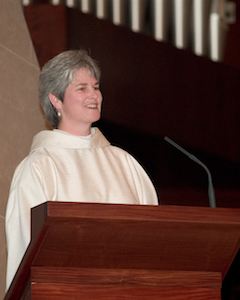
by Megan McElroy OP
HOMILY: Feast of Sts. Simon & Jude
Readings: Ephesians 2:19-22 and Luke 6:12-16
October 28, 2022
The story is told about a rabbi who asked his students, “When do you know that dawn has arrived?” His students replied, “When you can see the outline of a tree?” “No.” “When you can see the difference between a white and a black thread?” “No.” They continued to offer answers until the rabbi finally said, “When you look into the eyes of another and only see a stranger, then it is still night. Dawn arrives when you look into the eyes of another and see a brother or the eyes of a stranger and see a sister.”
This is what Paul is getting at in today’s reading from the letter to the Ephesians. Paul is talking to the community that continues to see itself as separated, divided because of distinction – Jews and Gentiles, circumcised and uncircumcised, insiders and outsiders, us and them. But he says, “You are no longer strangers and sojourners but are fellow citizens with the holy ones, and members of the household of God.”
When Jesus came down the mountain from his night in prayer and chose Twelve from among his disciples, I imagine there was similar murmuring about his choices – not only among the crowd but from among the Twelve themselves. Distinctions and reputations would have prevented them from seeing in the others what Jesus saw. Imagine them looking at each other and what their thoughts might have been: “What’s he thinking choosing Simon and naming him Peter. Peter! Rock. He’s as hard-headed as a rock! Or James and John – they’re like a storm brewing waiting for the Messiah who will save us from Rome! And Simon the Zealot – that uncompromising fanatic! And to top it off, he’s chosen Matthew, Matthew the tax collector, that cheating lout who’s in collusion with Rome?! What is Jesus thinking?”
We are not unlike the community at Ephesus or the disciples and Apostles who, despite their closeness to Jesus, saw through the eyes of distinction. We have our ways of dividing the Body of Christ – through denominational, cultural, racial, sexual, national, economic, ethnic, and other lenses, traditions, and rules. We, too, make determinations – who can come to communion, who is allowed to be a part of the faith community, who belongs and who doesn’t, who are fully members and who are only partial. It is still night for us despite our baptism into the Body of Christ.
What does it take for us to bond ourselves with one another instead of seeing “the other, the stranger, the alien”? When comes the dawn for us? Today’s feast of Sts. Simon and Jude invites us to consider who we are called to be as a community of believers, as disciples of Jesus. We might think it’s a lost cause, but we can pray to Jude to intercede on our behalf that we might become one. We might prefer to rid ourselves of the zealots in our midst, but we can pray to Simon to intercede for us that the zeal of our faith might be a witness that leads others to Jesus, that leads us to one another.
It took three years and maybe longer for those who were called Apostles to bond and to become what Jesus knew they could be. It might take longer for us. It takes letting go of ego, of getting out of Spirit’s way, and recognizing who we are as “members of the household of God,” as sisters and brothers in Jesus Christ. For it is he who is the head, who “holds the whole structure together.” For it is Jesus who is our dawn.

